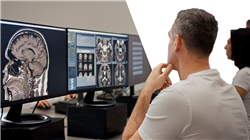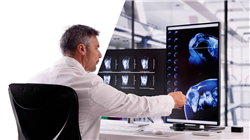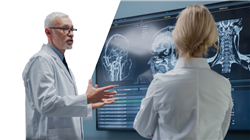University certificate
The world's largest artificial intelligence faculty”
Description
Through this Postgraduate certificate based on Relearning, you will design Deep Learning models that analyze medical images and predict the appearance of diseases such as Cancer”

The use of Big Data and Predictive Analytics in Medical Imaging is transforming the way healthcare professionals approach the diagnosis and treatment of diseases. So much so that the World Health Organization reveals in a recent report that 70% of clinical decisions are based on information obtained from imaging studies, underscoring the importance of improving accuracy and efficiency in their interpretation. Faced with this situation, physicians need to combine image data with Artificial Intelligence algorithms to predict the evolution of cardiac and oncological diseases, reducing diagnosis times.
In this context, TECH is launching a revolutionary program in Big Data and Predictive Analytics in Medical Imaging. Designed by references in this field, the academic itinerary will delve into areas ranging from Data Mining in biomedical image records with IBM Watson Imaging or applications of clustering and classification techniques in image records to computational models to simulate biological networks visible in images. The program will also delve into the most sophisticated visualization methods for the multidimensional representation of image data. Therefore, graduates will develop advanced clinical skills to implement algorithms that automate image segmentation, anomaly detection and pathology classification in various imaging modalities.
In addition, in terms of the program methodology, TECH is based on its revolutionary Relearning teaching system. This method consists of the progressive reiteration of key concepts to ensure that physicians achieve a full understanding of the content. In addition, for access to all the didactic resources, the only thing that graduates will need is an electronic device with an Internet connection (such as a cell phone, tablet or computer). Therefore, specialists will enter the Virtual Campus and will enjoy a variety of multimedia resources present in formats such as explanatory videos.
The Virtual Campus will be available 24 hours a day for you to access at a time that suits you best”
This Postgraduate certificate in Big Data and Predictive Analytics in Medical Imaging contains the most complete and up-to-date program on the market. The most important features include:
- Development of practical cases presented by experts in Artificial Intelligence
- The graphic, schematic and eminently practical contents with which it is conceived gather scientific and practical information on those disciplines that are indispensable for professional practice
- Practical exercises where the self-assessment process can be carried out to improve learning
- Its special emphasis on innovative methodologies
- Theoretical lessons, questions to the expert, debate forums on controversial topics, and individual reflection assignments
- Content that is accessible from any fixed or portable device with an Internet connection
Are you looking to handle advanced data visualization tools to represent findings in an understandable way for clinical practice? Achieve it through this program”
The program’s teaching staff includes professionals from the field who contribute their work experience to this educational program, as well as renowned specialists from leading societies and prestigious universities.
The multimedia content, developed with the latest educational technology, will provide the professional with situated and contextual learning, i.e., a simulated environment that will provide immersive education programmed to learn in real situations.
This program is designed around Problem-Based Learning, whereby the professional must try to solve the different professional practice situations that arise during the course. For this purpose, students will be assisted by an innovative interactive video system created by renowned and experienced experts.
The 100% online methodology characteristic of this program will allow you to enjoy an excellent update without depending on strict pre-established schedules"

You will delve into the most recent advances in the generation of automated forecast reports"
Syllabus
This university program has been designed by recognized experts in Big Data and Predictive Analytics in Medical Imaging, meeting the demands of today's labor market. The study plan will delve into the most sophisticated Data Mining techniques to identify patterns in medical images, which will allow professionals to detect early indicators of pathologies such as Neurodegenerative Diseases or Cardiovascular Disorders. In addition, the syllabus will delve into the use of predictive models for the early identification of diseases from images, which will help graduates to significantly optimize their diagnoses.

You will be able to train Deep Learning models to analyze medical images and predict the evolution of complex diseases such as Cancer”
Module 1. Big Data and Predictive Analytics in Medical Imaging
1.1. Big Data in Diagnostic Imaging: Concepts and Tools with GE Healthcare Edison
1.1.1. Fundamentals of Big Data applied to Imaging
1.1.2. Technological Tools and Platforms for Handling Large Volumes of Imaging Data
1.1.3. Challenges in the Integration and Analysis of Big Data in Imaging
1.1.4. Use Cases of Big Data in Diagnostic Imaging
1.2. Data Mining in Biomedical Image Registries with IBM Watson Imaging
1.2.1. Advanced Data Mining Techniques to Identify Patterns in Medical Images
1.2.2. Strategies for Extracting Relevant Features in Large Image Databases
1.2.3. Applications of Clustering and Classification Techniques in Image Registries
1.2.4. Impact of Data Mining on Improving Diagnosis and Treatment
1.3. Machine Learning Algorithms in Image Analysis with Google DeepMind Health
1.3.1. Development of Supervised and Unsupervised Algorithms for Medical Imaging
1.3.2. Innovations in Machine Learning Techniques for Recognition of Disease Patterns
1.3.3. Applications of Deep Learning in Image Segmentation and Classification
1.3.4. Evaluation of the Efficacy and Accuracy of Machine Learning Algorithms in Clinical Studies
1.4. Predictive Analytics Techniques Applied to Diagnostic Imaging with Predictive Oncology
1.4.1. Predictive Models for the Early Identification of Diseases from Images
1.4.2. Use of Predictive Analytics for Monitoring and Treatment Evaluation
1.4.3. Integration of Clinical and Imaging Data to Enrich Predictive Models
1.4.4. Challenges in the Implementation of Predictive Techniques in Clinical Practice
1.5. Image-Based Artificial Intelligence Models for Epidemiology with BlueDot
1.5.1. Application of Artificial Intelligence in the Analysis of Epidemic Outbreaks Using Images
1.5.2. Models of Disease Spread Visualized by Imaging Techniques
1.5.3. Correlation Between Epidemiological Data and Imaging Findings
1.5.4. Contribution of Artificial Intelligence to the Study and Control of Pandemics
1.6. Analysis of Biological Networks and Disease Patterns from Images
1.6.1. Application of Network Theory in the Analysis of Images to Understand Pathologies
1.6.2. Computational Models to Simulate Biological Networks Visible in Images
1.6.3. Integration of Image Analysis and Molecular Data for Mapping Diseases
1.6.4. Impact of these Analyses on the Development of Personal Therapies
1.7. Development of Image-Based Tools for Clinical Prognosis
1.7.1. Artificial Intelligence Tools for the Prediction of Clinical Course from Diagnostic Images
1.7.2. Advances in the Generation of Automated Prognostic Reports
1.7.3. Integration of Prognostic Models in Clinical Systems
1.7.4. Validation and Clinical Acceptance of AI-Based Prognostic Tools
1.8. Advanced Visualization and Communication of Complex Data with Tableau
1.8.1. Visualization Techniques for the Multidimensional Representation of Image Data
1.8.2. Interactive Tools for the Exploration of Large Image Datasets
1.8.3. Strategies for Effective Communication of Complex Findings Through Visualizations
1.8.4. Impact of Advanced Visualization on Medical Education and Decision Making
1.9. Data Security and Challenges in Big Data Management
1.9.1. Security Measures to Protect Large Volumes of Medical Imaging Data
1.9.2. Challenges in Privacy and Ethics of Large-Scale Image Data Management
1.9.3. Technological Solutions for the Secure Management of Healthcare Big Data
1.9.4. Case Studies on Security Breaches and how they Were Addressed
1.10. Practical Applications and Case Studies on Biomedical Big Data
1.10.1. Examples of Successful Applications of Big Data in the Diagnosis and Treatment of Diseases
1.10.2. Case Studies on the Integration of Big Data in Healthcare Systems
1.10.3. Lessons Learned from Big Data Projects in the Biomedical Field
1.10.4. Future Directions and Potentials of Big Data in Medicine

Give a quality boost to your career as a physician by incorporating the latest trends in Big Data and Predictive Analytics in Medical Imaging into your practice. Enroll now!”
Postgraduate Certificate in Big Data and Predictive Analytics in Medical Imaging
Today, the intersection between technology and medicine is revolutionizing the way diagnoses and treatments are performed. The use of Big Data and predictive analytics in medical imaging enables healthcare professionals to improve the accuracy of their assessments and make informed data-driven decisions. In response, TECH devised the current Postgraduate Certificate, designed to equip participants with the necessary tools to lead in this emerging field. The program is offered through online classes, providing students with the flexibility to study from anywhere and at a time that best suits their needs. During the course, students will explore how Big Data can transform medical imaging, from data collection to analysis and interpretation of results. They will be taught how to use predictive analytics techniques to identify patterns and trends in medical imaging data, contributing to more accurate diagnoses and more effective treatment.
Get your degree from the best Artificial Intelligence Faculty
TECH Global University of Technology is distinguished by its cutting-edge academic approach and commitment to excellence. Professors, with expertise in the field of artificial intelligence and medicine, will guide students in learning advanced tools and methodologies, ensuring that they can apply what they learn in real work scenarios. This hands-on approach is essential for those who wish to excel in an increasingly competitive work environment. The course is aimed at healthcare professionals, systems engineers and data analysts looking to expand their knowledge in the application of Big Data in the medical field. Upon completion, students will not only have acquired technical skills, but will also be able to implement innovative solutions to improve patient care and optimize processes in the healthcare environment. Take advantage of this excellent opportunity and join the largest Artificial Intelligence Faculty you will find in the market.







